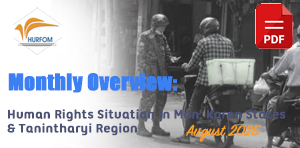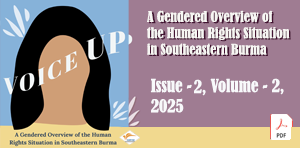Locals in Thanbyuzayat Township Continue to face Abuses of Land and Property Rights
January 31, 2012
HURFOM: Thanbyuzayat Township: Local residents, who are heavily dependent on farming and tapping rubber trees from their own lands for their livelihoods, face abuses of land confiscation, property destruction, and extortion. Government Infantry Battalion (IB) No. 62, Military Advanced Training School No. 4 and Artillery Regiment Command (ARC) No. 315, commits these abuses. HURFOM’s interviews, conducted with victims of the land seizure, extortion and property destruction, reveal that local farmers have not only had their huts that were built on their farms burnt down. Additionally, they had their farms seized, while rubber-plantation owners have had their plantations taken over, as well as being extorted. The abuses unveiled in this report took place in Sa-khan Gyi, Taung Aunk, Pain Nae-taw and Ka-line Pa-daw villages, Thanbyuzayat Township. All interviews were conducted between thesecond week of November and the beginning of December 2011.
Gov’t Battalion Burnt Down farming huts after Confiscating the Farms
During the last two weeks of September 2011, troops led by Captain Min Htun, from the government’s Infantry Battalion (IB) No.62, burnt down huts owned by villagers on their farms. Once again, these troops frightened local residents that [if there is any] house, hut or any other construction, built on land marked as ‘Army Land’ by the government, the Infantry Battalion would burn all down. According to local farmers, those farms are not property of the army. Since the land owners/farmers did not have any funds to cultivate their farms, these farms have been abandoned approximately two-and-a-half years ago. However, those abandoned farms were seized by IB No. 62, which was deployed to guard the gas pipeline.
Saw Naing Win (pseudonym for security purposes),owner of damaged property, explained how his hut, which was as large as an ordinary house, a hut to store hay, and a cowshed were burnt down by the IB No. 62:
“I have become so poor that I could not finance my farm, as I did not have any money to invest in it. These investments would include the costs of [paddy] seedlings, fertilizers, pesticides, and hiring laborers. Since 2009, for this reason, my 6-acre farm has been left without being cultivated. Now, the army took over, assuming the farmers no longer work on their farms. Yet, the army men did not only confiscate the farms, but they also burnt down three huts on my farm as they took over the farm. These were all my belongings. Now, I have only two oxen left with me. My daughters and sons are now working in Thailand. Since they cannot send money back, I can not cultivate the farm. It was in September that eight government soldiers came to burn down the huts on my farm. The leader was Capt. Min Htun. But, now he has transferred to somewhere else – that is what I heard. I am attempting to and want to get my farm back, so help me please,” said Saw Naing Win.
According to Saw Naing Win and his wife, similar to their experiences and sufferings, eight other farm-owners were unable to cultivate their farms. These farmers had their farms confiscated in Sa-khan Gyi village and comprised of 48 acres in total. Until today, those farms are left without being cultivated as Army Land and the farms are given to the Sa-khan Gyi village’s administrator.
Rubber Plantation owners wishing to get back the plantations after over one year confiscated
Rubber plantation owners in Thanbyuzayat, expressed that they want to regain and work on their plantations that were confiscated by Thanbyuzayat based IB No. 62. These plantation owners are native to Sa-khan Gyi, Taung Out, Pain Nae-taw and Ka-line Pa-daw villages and stated that they requested human rights activists to help them get back their plantations after they had their plantations seized over one year ago.
“The rubber plantation that our family owns is 8.4 acres. The rubber trees were as old as 30 years when they were taken over last year. Our rubber plantation was confiscated by Thanbyuzayat based IB No.62 and Wae Kalee based Military Advanced Training School captains. After confiscating the plantation, IB No. 62 charged [us, the owners] 20,000 Kyat for the permission of tapping the rubber trees on [our] own plantation. After 3 months of working on our farm, the rubber trees on our plantation became 30 years and the trees were pretty old. So, they cut down the old rubber trees. The villagers from Taung Out village were forced to work on cutting down the rubber trees, and then plant new rubber plants during the beginning of the rainy season. For us, we wanted to get back to our plantation. And, we wanted to work on our plantation again. Now, it has been over one year since the plantation was taken over. I am a bit worried that it will be difficult to request to get our plantation back, if it was confiscated such a long time ago. In this case, for us, we need help from those activists or groups working to improve our land and human rights,” said Nai Chan Dein.
Nai Chan Dein [pseudonym], 46, a Sa-khan Gyi villager, is now working on the remaining three acres of his rubber plantation in Sa-khan Gyi village, Thanbyuzayat Township, Mon State. HURFOM conducted an interview with him in the second week of November.
Plantation owners still charged with monthly allowances by the ARC No.315 for not to seize the plantations
A Taung Aunk villager, Saw Pain Phyo [pseudonym], 40, who wants to keep working on his 5-acre rubber plantation recounts that he [has to] continue paying a monthly 30,000 Kyat fee to Captain Taw Zin Htun from Artillery Regiment Command No. 315 for the permit of tapping rubber trees on his own plantation:
“It is as if they took over my rubber plantation. Most of the land [rubber plantations] that has been considered as Army Land, is confiscated by Thanbyuzayat based IB No. 62, Military Advanced Training School No. 4 based in Wae Kalee village, and Artillery Regiment Command (ARC) No. 315. When they took over the plantations, there was no proof shown and there were no official letters that ordered that our land would be confiscated. These officials, acting on behalf of the government would set up signs indicating that our land would be Army Land for four months and then ended up seizing our plantations. Later, a verbal order from Sergeant-level Aye Kyaw from ARC No. 315 came to me that I have to pay 30,000 Kyat in monthly allowances, if I want to keep working on my 5-acre plantation. This was all last year, after the water festival. Now still, I have to pay these fees. But, the people that are in-charge to collect the monthly fees changed; yet people come to gather fees as usual. Even during rainy season, we are being charged although we cannot tap rubber trees during this season. We know that it’s not fair to pay money to work on a plantation that is ours; however, we continue to pay fees although we are short of money. This is because we are just worried that those who can pay will come to work on our plantation and we will lose our plantation if we do not pay 30,000 Kyat every month. Because of these costs, we cannot afford to send our daughter to school. We have managed to survive and pay these fees, so far. To solve this issue, I am not brave enough to report about this to anyone, not even brave enough to report during this new government’s term. I can only continue to wait what will happen. I cannot do anything since the army men are still here. Like me, there are more than 40 other rubber plantation owners who do not want to have their plantations lost and have to pay 20,000 – 50,000 Kyat fees per month respectively, depending on how many acres their plantations are,” remarked by Saw Pain Phyo.
Saw Pain Phyo is 40 years old and he is from Taung Aunk village, Thanbyuzayat Township. HURFOM conducted an interview with him on 2 December, 2011, after meeting him in Ye Township.
The Infantry Battalion No.62 is based in Thanbyuzayat Town and the Military Advanced Training School No. 4 and Artillery Regiment Command No. 315 are based in Wae Kalee village, Thanbyuzayat Township. It is obvious that the government troops stated above continue to violate the local residents’ rights despite installing a new civilian government. Also, even though the signs of change are startling in the country, for those locals residing in rural areas, particularly in Sa-khan Gyi, Taung Aunk, Pain Nae-taw, and Ka-line Pa-daw villages, Thanbyuzayat Township, no changes have been implemented. Instead, villagers continue to suffer from the same human rights abuses that they faced during the former government – the State Peace and Development Council.
Comments
Got something to say?
You must be logged in to post a comment.



















































